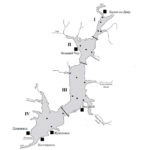CURRENT STATE AND LONG-TERM DYNAMICS OF ZOOPLANKTON OF THE TSIMLYANSK RESERVOIR (DON RIVER, RUSSIA)
Lazareva V.I. CURRENT STATE AND LONG-TERM DYNAMICS OF ZOOPLANKTON OF THE TSIMLYANSK RESERVOIR (DON RIVER, RUSSIA) // Arid ecosystems. 2021. V. 27. № 2 (87). P. 112-119 | PDF
The structure and distribution of zooplankton of the Tsimlyansk Reservoir was studied in August – September 2018. It was shown that the amount of zooplankton was halved from the Upper part of the reservoir (2.4 ± 0.8 g / m3) to the dam of the Tsimlyanskaya hydroelectric station (1.2 ± 0.6 g / m3), Copepoda formed 70% of the biomass. Ponto-Caspian Heterocope caspia and invaders Calanipeda aquaedulcis, Thermocyclops taihokuensis and Acanthocyclops americanus were abundant copepod species. According to literature data, the dynamics of the zooplankton abundance in the reservoir for more than 65 years of its existence (1952–2018) is analyzed. A more than double (up to 2.1 ± 0.5 g / m3) biomass of the community was revealed in 2015–2018 compared with the 40-year period until 2013 (0.8 ± 0.1 g / m3). The trends in the dynamics of the zooplankton abundance in the Tsimlyansk reservoir are discussed, including the importance of the Ponto-Caspian crustaceans and invaders from other regions in the community.
Keywords: Don River, Tsimlyansk reservoir, zooplankton, invaders, structure, abundance, long-term dynamics.
DOI: 10.24411/1993-3916-2021-10157


